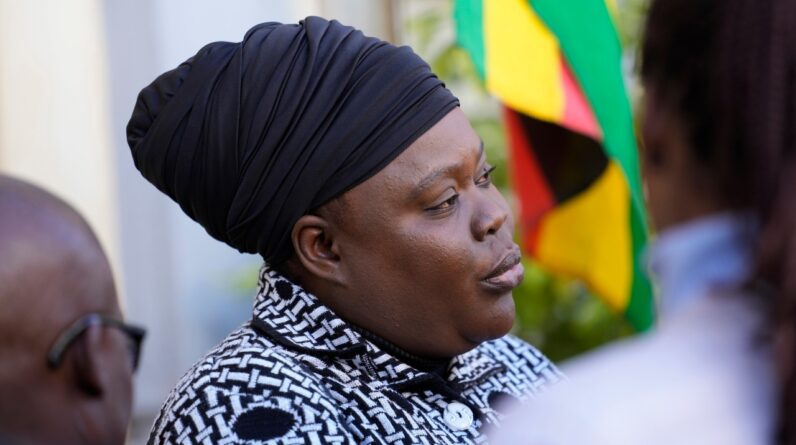
HARARE, Zimbabwe (AP) – In a large room at the headquarters of Zimbabwe’s ruling ZANU-PF party, women responded with roaring cheers when President Emmerson Mnangagwa described them as the “backbone” of the party whose votes are vital to victory in elections scheduled for August.
At a recent opposition rally, women with their male party leader’s face emblazoned on dresses and skirts sang, danced and vowed to vote for change, never mind that the election will once again represent a status quo where women are largely limited to cheering.
This year it looks worse because the number of female candidates has plummeted, despite women making up the majority of the population and traditionally the largest number of voters.
“We have some of the best laws and policies on gender equality and women’s representation, but that’s only on paper. The reality on the ground is that women’s role in politics is limited to being ardent supporters and reliable voters,” said Marufu Mandevere, a human rights lawyer in the capital, Harare.
The dearth of female candidates puts Zimbabwe at odds with trends on the continent. According to a report released in March by the Inter-Parliamentary Union, the number of women in national parliaments in sub-Saharan Africa rose from 10 percent in 1995 to an estimated 27 percent in 2022. The IPU describes itself as a global organization of national parliaments established in 1889.
In Zimbabwe, a patriarchal southern African nation of 15 million people, gender bias is still rampant. Men have historically dominated the political, economic, religious and social spheres. The Aug. 23 election suggests change may be over the horizon, despite vigorous local campaigns and global pressure to increase female participation in decision-making.
In the last election, in 2018, there were four female presidential candidates, a record. When registration closed on June 21 this year, there were 11 male candidates, and no women.
In the end, one woman managed to qualify for the vote, but only just. Elisabeth Valerio was one of two women, along with Linda Masarira, who were turned away for failing to pay the $20,000 registration fee on time, up from $1,000 in 2018. In July, Valerio successfully challenged the decision in court.
For the National Assembly, there are 70 women candidates against 637 men in 210 constituencies. This represents 11% of candidates, down from 14% in 2018.
Parliamentary candidates must pay $1,000 to register, up from $50 in previous elections, and that’s before the huge sums needed to compete in a country where vote-buying is rampant.
“Historically, women have been pushed out of the economic sphere… This deprivation is now being used to push us out of the race for public office,” lamented Masarira. “Political leadership is a preserve of rich men.”
Many women chose to stay away rather than try to raise these “exorbitant fees,” she said.
Lobbyists are disappointed, especially after campaigning hard ahead of the party’s primaries.
In February, the main political parties signed a “Women’s Charter”, promising action to increase the number of female candidates as part of a #2023LetsGo5050 campaign driven by a coalition of women’s rights groups.
When candidate registration closed, the biggest political parties had fielded less than 12 percent of women candidates each in the National Assembly, said the Women’s Academy for Leadership and Political Excellence, or WALPE, a local non-governmental organization.
WALPE described the numbers as a “slap in the face”, accused the parties of “tokenism” and threatened to campaign against them “as the only way” to show women’s determination to get a seat at the table. Now, the group is running a campaign urging women voters to choose other women to appear on the ballot.
Those women who do run for public office also suffer from derogatory stereotypes.
Take Judith Tobaiwa, an opposition politician and the first woman MP from a politically volatile constituency in central Zimbabwe. She is seeking re-election. But for her detractors, gender seems to trump the 35-year-old’s record.
“What’s so special about Judy… How different is she from the other girls?” thundered a ruling party activist during a recent rally in her constituency. “If it’s about being a prostitute, we also have prostitutes in ZANU-PF,” she said to applause for comments caught on video and later widely criticized by activists.
However, according to Mandevere, the human rights lawyer, women have proven to be effective leaders over many decades of multiple crises in Zimbabwe. These range from the HIV/AIDS pandemic that killed millions, to the coronavirus outbreak that left many women and girls as heads of household, and a protracted and debilitating economic crisis that catapulted women to the forefront of defending families.
“That’s the sad part. We’re fine with women taking care of us at home in times of crisis, but we don’t know their ambitions when it comes to national politics,” she said.
___
AP Africa News:
Close Modal
Suggest a correction
Suggest a correction
[ad_2]
Source link





